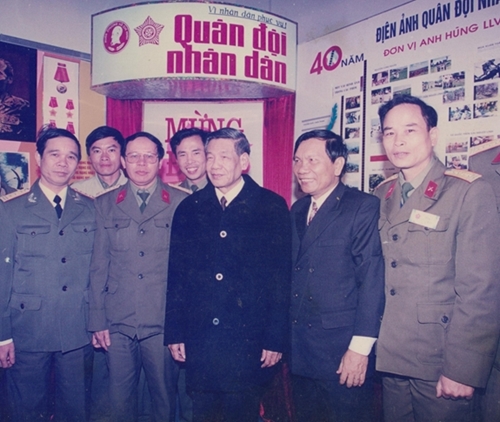Writers of the Military Arts and Letters Magazine (MALZ) often call former General Secretary Le Kha Phieu “uncle Phieu.” It is because he had always been close to troops in general and military writers in particular when he was the commanding officer and political commissar of Regiment 9 under Division 304 in Tri - Thien Theater during the fierce resistance war against U.S. imperialists. He never changed that way of life when he was later appointed to the post of political chief of Command 719 (Command of the Vietnamese Volunteer Soldiers in Cambodia).
    |
 |
|
Former General Secretary Le Kha Phieu and military journalists, writers, and artists |
In late 1988, Vietnam withdrew troops from Cambodia. He was promoted to the rank of Lieutenant General and assigned to the post of Deputy Director of the General Department of Politics. In 1991, he was the Director of the General Department of Politics and moved to live on Ly Nam De street, which is a military quarter. He then had more time to care for military writers.
I still remember that it was late one day in 1989, I saw him, the Deputy Director of the General Department of Politics, walking to the editorial office of the MALZ. I thought he might want to work with the leaders of the magazine, so I picked up the phone and called Editor-in-Chief Nguyen Tri Huan, who was at home at the time. To my surprise, Huan calmly told me that it was no problem and “uncle Phieu” just wanted to meet writer Nguyen Chi Trung to work on issues related to Cambodia.
Since then, I often saw him come to the magazine office after work, sometimes just to ask the writers about literary life. He paid special attention to the MALZ. The magazine had a supplement which drew a lot of readers then. He liked that supplement because he said that it was suitable for young people and reached readers faster. He then directed the MALZ to carefully organize the writing competition “The youth and the revolution” and he himself directly wrote for the competition and presented the highest prize to the winner.
When “uncle Phieu” became the Party General Secretary, he still spent time with artists and writers and often talked with writers of the MALZ. On each Lunar New Year Holiday (Tet Holiday), he always visited writer Nguyen Chi Trung, who was single and lived at the MALZ office (writer Nguyen Chi Trung and “uncle Phieu” were comrades-in-arms in Cambodia). I remember once he visited the MALZ on a Tet Holiday like that, he reminded the staff of the magazine to take good care of ethnic cultural identities, especially the conservation and promotion of Vietnamese culture.
On the Tet Holiday of 1999, he wrote in the MALZ, “…May all writers and artists have their best art works for the transition moment to the new millennium! A great century is going to pass by.” In 2001, he wrote, “The MALZ has printed pages of works with high artistic values, marking a most brilliant period of the nation and the military, which will live forever in the national history.” His words are great encouragement for the staff of the MALZ.
However, he also required writers to strengthen their responsibility. Addressing the national scientific conference themed “Current social ethics in arts and literature” held by the Central Literature and Arts Theoretical Council in Ho Chi Minh City in November 2014, he stressed the significant role of artists and writers. He underlined that writers must dwell deep into the lives of the people and soldiers in order to have better understanding of people and life. Their works must be in line with the burning desire of the people, meeting the requirements of the Fatherland, the revolutionary cause and the people.
Writer Hoang Dinh Quang, author of the famous war novel “Xuan Loc” called me upon learning of the passing of Comrade Phieu. He retold a story on the sidelines of the scientific conference in 2014. During break time, talking with “uncle Phieu” out in the corridor, he said, “Your speech today was excellent, more informal than the one you delivered at the Vietnam Writers’ Congress in 2000.” The former General Secretary smiled, “I was the Party General Secretary then, so I had to deliver a well-organized speech. Today, we are just brothers discussing literary works. There should be more sentiments and affection now!” Reciting the story, Quang said in grief, “We, soldier-writers, were so lucky to work under the leadership of a great general, a commander, and a friend like ‘uncle Phieu.’”
By Writer Ngo Vinh Binh
Translated by Huu Duong